|
Portable
Rock
Paintings |
|
33GU218
(Day's Knob) |
|
An
anthropomorphic painting (height 18 mm -
0.7") apparently in iron oxide on the edge of a sandstone
rock. For a while, markings like these at this site were not
presented as paintings because of the insistence
of some archaeologists that they must be the result of natural
dripping onto a rock's horizontal surface. But this figure, quite aside from its compelling appearance
of artificiality, is strong evidence to the contrary (confirmed
by a professional geologist) since the image is on the vertical
broken edge of the rock, perpendicular to its horizontal strata.
The rock, shown in the photo below, was found eroding next to a petroglyph
on the same material roughly 60 cm (24") below the current
unglaciated and undisturbed terrain surface. |
| Below: The cortical side
of the rock bearing the painting on its edge. Apparently natural
features have been artificially enhanced to produce the profile
image of a
mastodon head facing right. |
____________________
____________________
|
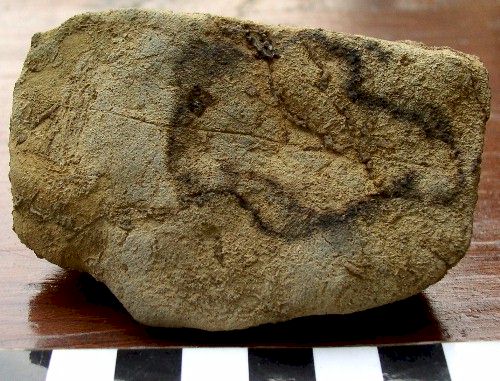
|
| A zoomorphic painting on
limestone. Note how the image conforms to the contour of
the rock. What it might represent is, of course,
debatable, but a flying juvenile bison seems
plausible, as suggested by Dr.
James B. Harrod, who has been very supportive of and
helpful to
this author since the launch of this website in 2003.
|
|
Below: The artifact viewed from
above. |
|
|
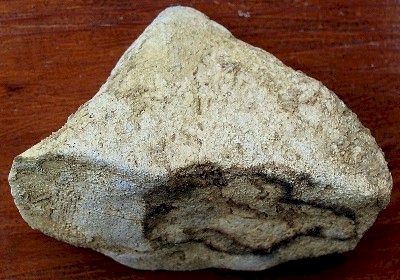
|
| Below: A close-up
of the pigmenting material, a hardened paste, in the
figure's eye. |
|
|
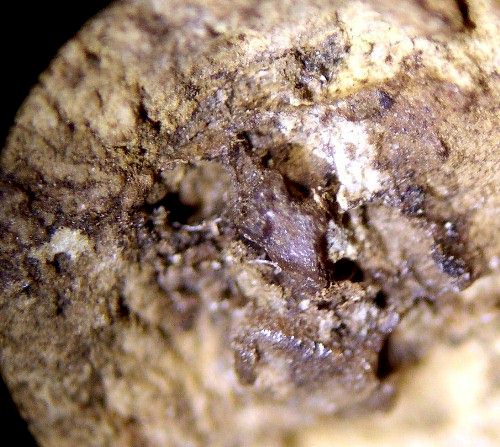
|
|
To confirm that it is not a
natural occurrence, this piece was taken to the labor- atories
of NSL Analytical Services in Cleveland, Ohio for compositional analysis
by x-ray fluorescence spectroscopy (XRF). It was determined that
the dark material is a superficial layer of red ochre
(iron-oxide-based pigment) quite
distinct from the limestone. (Ohio state archaeologists
had insisted that it was an integral part of the rock.) The table below shows the
elemental compositions of the limestone and of the pigmentation: |
|
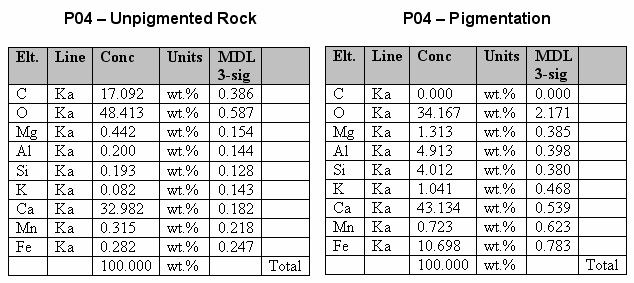
|
____________________
____________________
| Another painting on limestone, a more or less anthropomorphic
figure. Note
the typical subparallel incised striations on the rock. |
| These two paintings on
limestone seem to present the fairly common theme of the heads
of two creatures face to face. |
|
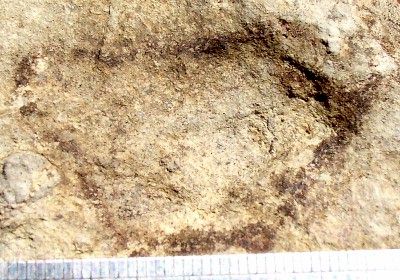
|
|
A zoomorphic
figure on limestone. |
|
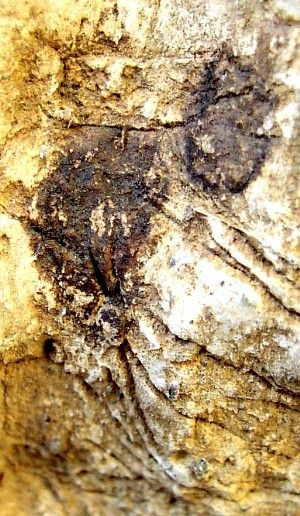
|
| An interesting combination of
painting and carving on limestone. This surface is from
the rock's interior, the piece having been carved from a larger
stone. The opposite site is cortex (natural exterior
surface.) This figure is small - the height of the larger
(lower left) painted surface is only 8 mm (0.3"). |
| The eye on this limestone
horse-like carving was painted with the same material. |
| A painted bird-form
limestone. The theme is not exactly obvious, but may be
the common one of zoomorphic figures emerging from other
figures. |
|
The reverse
side. Note the distinctly carved beak. |
|
Top
of Page
| Click your browser's
"Back" button to return to the point from
which you entered this page. |
HOME

|
|